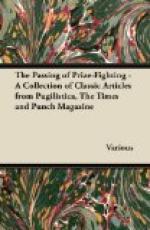We are both in it, but the initiative rests with her. She asks me to take two Belgian refugees and the housemaid and the dog and the laundry-hamper along with me in the two-seater to the station, to save petrol. Well, I am willing. She fills the herbaceous border with alternating potatoes and carnations. Well, I am more than willing. She bottles peas and beans. And I say to you that I am proud and happy that she should think of these things.
Above all she gets at the very root of the food problem. I should say that here she has advantages over some, as I belong to the class of husband known as Easily Fed. She has got hold of a whole sheaf of leaflets from the War Office or somewhere—“When is a pie not a pie?” “Leave out the egg;” “How to make something out of something else,” etc., etc.; and we feed on those chiefly. She knows I don’t like rabbits, and yet I am well aware that rabbits are repeatedly insinuated in such forms as not to leave a single clue. I cannot tell you how I admire and approve. Still it makes me thoughtful sometimes.
No doubt you will believe that we are being drawn together by sharing these hardships. Well, yes. In a way. And yet I don’t feel easy about it. We are quite in sympathy, but there is a difference in our point of view. Mine, I affirm, is the nobler. I economize, although I loathe it; while she, I am convinced, is beginning to like it. I don’t mean to say that she does it on purpose, but that phrase may give you an idea what I mean. I sometimes wonder wistfully if the hand that put that ugly new steel contraption at the back of the fire to save the coal is really the hand that I wooed and won ten years ago. I see in her the steady growth of an implacable conscience. In moments of depression I have a horrid feeling that she always wanted to do this sort of thing and never got a real chance till now.
We were extraordinarily happy before the War. We were not at all hard up and we had no compunctions about spending money. But now—I wonder how long the War will last? What I am afraid of is the formation of habits. I am already guarding against it by talking about all the things that we are going to do after the War. She quite agrees with me about them, but she isn’t enthusiastic. I put my claims pretty high. The garden is to be reconstructed, and I am adding a wing to the house. We are going to travel first, and I am not sure that we shan’t have a new cook. And we are to have an Airedale and an Axminster, and a Stilton and a new Panama.
As a matter of fact that is all bluff on my part. I only want to have something in hand to bargain with. If I can ever get back to the status quo ante I will not ask for annexations.
Well, that is how it is. Most eagerly do I fall in with her latest suggestion that I should let her clean my flannel suit with benzine (I don’t like the smell of it) instead of getting a new one. Only I live in a growing fear that the day when peace is signed in Europe will be the signal for an outbreak of a new form of warfare in our happy home.




